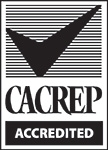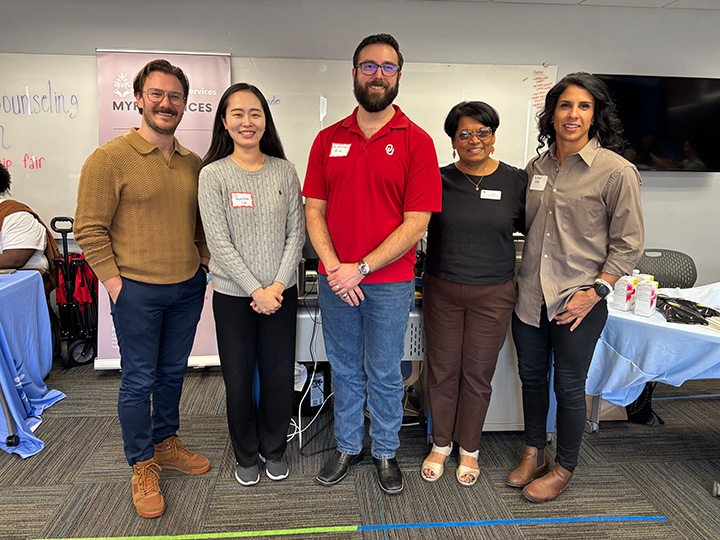Program receives CACREP accreditation in Clinical Mental Health Counseling through 2032
The Professional Counseling Program is committed to delivering quality in-person instruction and professional training to prepare students at the master’s level in clinical mental health counseling (LPC), school counseling (state certification) and addictions counseling (LADC).
Our program is accredited by the Council for Accreditation of Counseling and Related Educational Programs (CACREP) in the specialty area of clinical mental health counseling.

The Professional Counseling Program consists of 60 semester hours leading to the Master of Education (M.Ed.) degree meeting the Council for Accreditation of Counseling and Related Educational Programs (CACREP) standards in the specialty area of clinical mental health counseling. The Clinical Professional Counseling Program offers (1) a 60-hour track that meets the state of Oklahoma Licensed Professional Counselor (LPC) requirements, (2) a 15-hour Drug and Alcohol counseling certificate (3) and a 15-hour School Counseling certificate. Both 15-hour certificates can be pursued independently or serve as a concentration in the Clinical Professional Counseling Program. The Drug and Alcohol Counseling certificate includes five specialized courses that have been approved by the Oklahoma Board of Mental Health and Substance Abuse Services. The School Counseling certificate offers core classes in Counseling along with classes in Special Education and prepares students to become Certified School Counselors in Oklahoma.
LPC application materials, other forms, and rules and regulations governing licensure are available on the Oklahoma State Board of Behavioral Health Licensure website at: ok.gov/behavioralhealth. Students who wish to pursue credentials in other states must contact the appropriate authority in those states in order to determine those requirements.
The 60-hour Clinical Professional Counseling track prepares graduates to counsel in clinical mental health settings, such as mental health agencies, drug abuse treatment centers, child protective services, child counseling clinics, hospitals, geriatric centers, family counseling centers and private practice.
OU Clinical Professional Counseling Program
Program/Student Outcomes
| Academic Year | Admission | Total Enrollment | Graduates | Completion Rate | Licensure Pass Rate | Employment Rate |
|---|---|---|---|---|---|---|
| 2021-22 | 14 | 30 | 11 | 100% | 90.9% | 100% |
| 2022-23 | 24 | 40 | 15 | 100% | N/A | N/A |
The guiding philosophy, goals, policies, and practices of the Professional Counseling Program are shaped by its central commitment: To develop socially-conscious professionals, facilitate community, and engage in community-focused, ecologically sensitive research and practice.
The Professional Counseling Program is committed to developing and disseminating knowledge through research and scholarly activity, delivering quality instruction and professional training to prepare students at the master’s level in clinical mental counseling, school counseling, and addictions counseling to work as practitioners in a variety of settings including community mental health agencies and schools. The curriculum emphasizes the necessary competencies and clinical training for licensure as a professional counselor (LPC), with options for school counselor certification and licensed alcohol and drug counselor (LADC). The Professional Counseling Program values ongoing and open dialogue to build relationships toward healing and wellbeing in our communities and ourselves; a continuous and reflective learning experience for our students and ourselves; and a responsive approach critical of culturally encapsulated concepts within the counseling profession.
The vision of the faculty in the Professional Counseling Program is to improve the capacity of the counseling profession to maximize effective service delivery through a nationally competitive, learning-centered, program of excellence to empower individuals and communities in Oklahoma, the nation, and abroad through a wellness perspective.
The objectives of the Clinical Professional Counseling program are:
The Professional Counseling program faculty and the program’s Professional Counselor Training Lab are located in the Department of Educational Psychology. These can be found on the third floor of Ellsworth Collings Hall, which houses the College of Education.
Program Coordinator: Delini M. Fernando, Ph.D., LPC-S (OK), NCC
Cian L. Brown, Ph.D., LPC (OK), LPC-S (AR), NCC, CCAT, BCN
G. Michael Russo, Ph.D., LPC-S (OK), LPC (OK), NCC, BCN
RJ. Wilson, Ph.D, LPC-S (OK)

Professional Counseling faculty at the Jeannine Rainbolt College of Education.
The Professional Counseling program (M.A. degree in Clinical Mental Health Counseling) at the University of Oklahoma has obtained accreditation from the Council for Accreditation of Counseling and Related Educational Programs (CACREP) until March 31, 2032.
Evaluation Results and Student Outcomes
Number of graduates in the past year
19
Degree completion rate
95%
Licensure or certification examination pass rate
91-100%
Combined employment and doctoral admissions rates of students/graduates
91-100%
